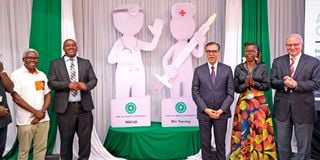Aga Khan University unveils ‘doctor of the future’ programmes

From left: Aga Khan University Dean Medical College EA, Prof Lukoye Atwoli, Ministry of Education, Director University Education, Darius Mogaka Ogutu, Aga Khan University Vice Chancellor Dr Sulaiman Shahabuddin, Dean School of Nursing and Midwifery EA, Prof Eunice Ndirangu and Deputy Vice-Chancellor Dr Carl Amrhein during the launch of new undergraduate programmes in medicine and nursing on April 25, 2023.
The Aga Khan University (AKU) yesterday launched two new undergraduate degree programmes for Bachelor of Medicine and Bachelor of Surgery (MBChB) and Bachelor of Science in Nursing that it says will produce “the doctor of the future”.
The launch followed accreditation by the Commission for University Education and the institution will now admit students on a direct entry basis based on merit, for the first time, beginning September 2023.
Admissions for the two programmes are currently ongoing and will close on May 12, 2023.
“It has taken us 20 years to get here but in those years, we’ve not been idle. We’ve been working hard. His Highness The Aga Khan has given us guidance on these programmes and we thank him for the support,” said AKU Vice Chancellor Sulaiman Shahabuddin.
The Bachelor of Science in Nursing will be a four-year programme while the Bachelor of Medicine and Bachelor of Surgery (MBChB) will take students six years to cover. The programme is designed to prepare medical doctors grounded with knowledge, competencies and skills in humanities, social sciences and medical sciences.
“These programmes come at an opportune time – when the country, and the region at large is committed to achieving Universal Health Coverage. Our contribution as AKU is to ensure we produce leaders in healthcare who are committed to the communities they serve,” said Dr Shahabuddin.
Greater demand
“The demand has never been greater, and our undergraduate programmes have been designed to meet that demand. The Aga Khan University is ranked among the top two per cent of universities in the world. Students applying to these programmes are going to learn from the best faculty, with access to state-of-the-art facilities and acquire a globally recognised degree at the end of their studies,” he said.
The Dean of the Medical College Prof Lukoye Atwoli said the training for the two programmes will incorporate the use of technology and an inter-disciplinary approach to produce ‘the doctor of the future’.
“The fact that we have a high number of unemployed doctors and nurses doesn’t mean we don’t have a shortage. It’s a problem of absorption and distribution,” he said.
The chief guest at the launch was the University Education director at the Ministry of Education, Darius Ogutu, who represented the principal secretary, Dr Beatrice Inyangala.
He termed the new undergraduate programmes a significant development for the education and healthcare industry.
“I look forward to working with Aga Khan University and other stakeholders to nurture the next generation of leaders who will help us collectively improve healthcare outcomes and access to care for communities in need – which is our goal in achieving Universal Health Coverage,” he said.
Currently, the Medical College, East Africa offers nine residency programmes through its Postgraduate Medical Education and nine fellowship programmes in Nairobi and over 60 per cent of its graduates are currently working in public and private sector hospitals in the countries they serve.
The School of Nursing and Midwifery, East Africa has so far produced more than 3,000 nurses and midwives across the region.






